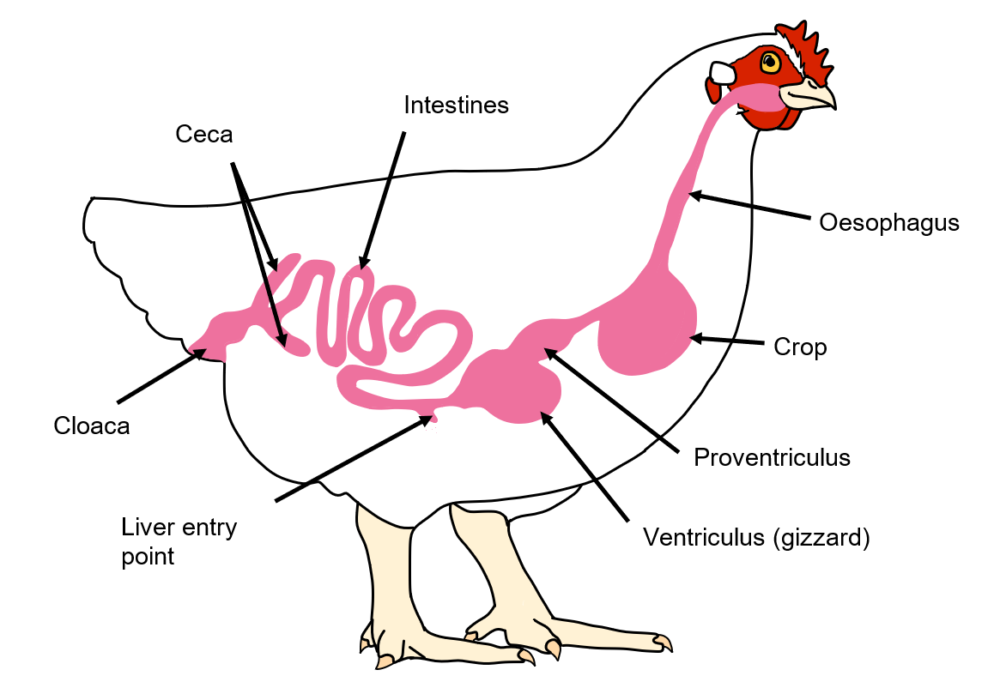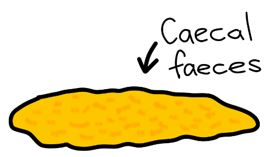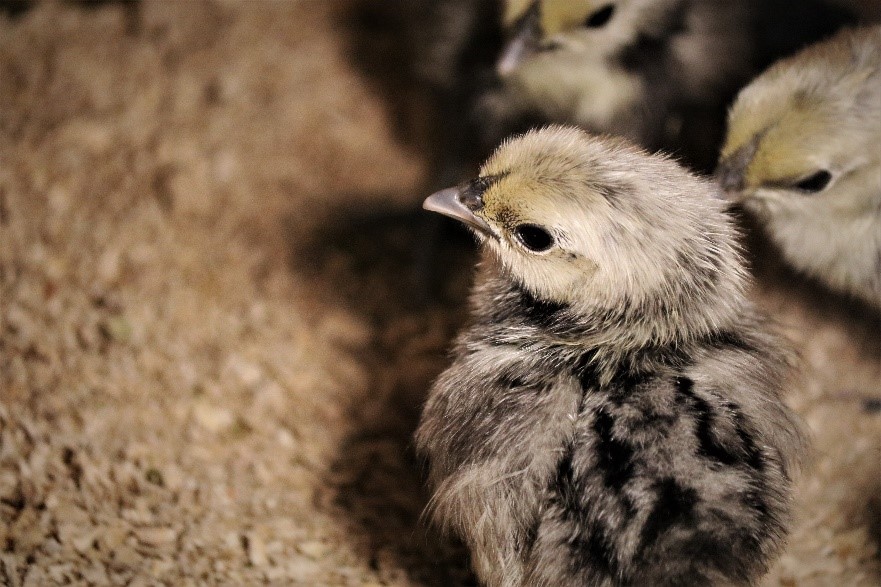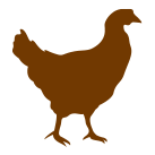No Guts, No Glory!
Poultry Gut Health
You are what you eat! This concept is vitally important for your feathered friends! Dive into this behind-the-scenes world of how important chicken guts really are.

| Definitions | |
| Bacteriostatic | A compound that stops bacteria multiplying, it does not kill already established bacteria |
| Microbiome | All the microorganisms present in a certain niche area such as the gut |
| Pathogenic | A microorganism that causes disease |
The chicken gastrointestinal system is the main region for breaking down and absorbing nutrients needed for growth and production. This amazing system is also home to many beneficial microbes that form a microbiome which help your chicken to get the most from its food. The link between gut health and overall health in animals is starting to make some exciting discoveries! If chickens have a healthy gut microbiome, it can provide protection, boost immunity, aid in nutrition and digestion, increase growth rates and keep your chicken in peak condition.
Parts of the Gastrointestinal System
Oesophagus – pathway from the mouth to the crop
Crop – food storage area which allows the bird to intake a large amount of food at one time. This allows the bird to then move to a safe area to sunbathe and relax instead of having to constantly eat throughout the day
Proventriculus – the first stomach of a bird, it is glandular and contains digestive secretions for food breakdown
Ventriculus – the second stomach of a bird, it is muscular and contains grit which is used to crush grains and other large feed particles
Liver – produces bile acids that drain into the intestine and help with fat digestion
Intestines – the region for further digestion and absorption of nutrients and water
Caeca – two blind endings within the intestine where undigested feed can ferment and be absorbed. This is emptied every
Cloaca – common opening for the digestive and urogenital tracts

The Gut Microbiome
The gut microbiome is comprised of all the microbes living within your chicken’s gut, most of which are beneficial bacteria such as Lactobacilli, Clostridia and Bacteroides. These helpful bacteria act as a protective barrier within the gut, stopping pathogenic bacteria from colonising and causing disease. Beneficial bacteria also help your chicken by producing the following:

- Vitamin K and B – needed for metabolism, calcium regulation and blood components
- Short chain fatty acids (SCFA) – bacteriostatic which inhibits Salmonella growth
- Organic acids – lower gut pH to inhibit pathogenic bacterial growth
- Natural antimicrobials – destroy pathogenic bacteria
- Lowering triglycerides (unhealthy fats) – can help control obesity
Other microbes in your chicken’s gut may be opportunistic pathogens, meaning they are normally found in your birds but only cause disease when the bird is stressed or immunocompromised.
What is Dysbiosis?
Dysbiosis refers to an imbalance of the normal beneficial gut microbes. This can be caused by a disproportionate increase in certain gut microbes, infection with a pathogenic microbe, or by external factors such as environmental stress, antibiotic use, nutritional imbalances or poor management.
Faeces

Normal poultry faeces contain three different components: faecal material, urates and urine.  The majority of excreta is faecal material, followed by urates and a small amount of urine. The amount of urates will increase if your bird is eating extra protein. Chickens will also produce mustard-coloured faeces 1-2 times a day which come from the caeca, these are a normal finding. Causes for concern include green, watery or bloody faeces.
The majority of excreta is faecal material, followed by urates and a small amount of urine. The amount of urates will increase if your bird is eating extra protein. Chickens will also produce mustard-coloured faeces 1-2 times a day which come from the caeca, these are a normal finding. Causes for concern include green, watery or bloody faeces.
How to help your bird’s microbiome
It’s not too hard to keep your chicken’s microbiome healthy and improve your chicken’s health. Using agents like antibiotics will kill off beneficial bacteria and could detrimentally affect your bird. Try to follow these handy points:
- Provide a quality nutritionally balanced diet
- Ensure good husbandry and environmental management to reduce stress and microbe burdens in your chicken’s surroundings
- Only use antibiotics when they are absolutely needed
- Make your chicken snacks healthy! Mix in quality fermented products like kefir and electrolytes during stressful periods to give your poultry a boost

Breanna Carr – 5th Year Veterinary Science Student

